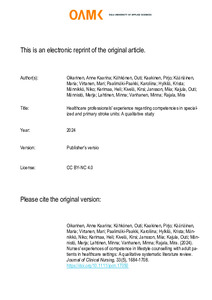Nurses' experiences of competence in lifestyle counselling with adult patients in healthcare settings: A qualitative systematic literature review
Oikarinen, Anne Kaarina; Kähkönen, Outi; Kaakinen, Pirjo; Kääriäinen, Maria; Virtanen, Mari; Paalimäki‐Paakki, Karoliina; Hylkilä, Krista; Männikkö, Niko; Kerimaa, Heli; Kivelä, Kirsi; Jansson, Miia; Kajula, Outi; Männistö, Merja; Lahtinen, Minna; Vanhanen, Minna; Rajala, Mira (2024)
Oikarinen, Anne Kaarina
Kähkönen, Outi
Kaakinen, Pirjo
Kääriäinen, Maria
Virtanen, Mari
Paalimäki‐Paakki, Karoliina
Hylkilä, Krista
Männikkö, Niko
Kerimaa, Heli
Kivelä, Kirsi
Jansson, Miia
Kajula, Outi
Männistö, Merja
Lahtinen, Minna
Vanhanen, Minna
Rajala, Mira
Wiley
2024
Julkaisun pysyvä osoite on
https://urn.fi/URN:NBN:fi-fe2024041216948
https://urn.fi/URN:NBN:fi-fe2024041216948
Tiivistelmä
Aims and Objectives:
To identify and synthesise nurses' experiences of competence in lifestyle counselling with adult patients in healthcare settings.
Background: Modifiable lifestyle risk behaviours contribute to an increased prevalence of chronic diseases worldwide. Lifestyle counselling is part of nurses' role which enables them to make a significant contribution to patients' long-term health in various healthcare contexts, but requires particular competence.
Design: Qualitative systematic literature review and meta-aggregation.
Method: The review was guided by Joanna Briggs Institute's methodology for conducting synthesis of qualitative studies. PRISMA-checklist guided the review process. Relevant original studies were search from databases (CINAHL, PubMed, Scopus, Medic and Psych Articles, Ebscho Open Dissertations and Web of Science). After researcher consensus was reached and quality of the studies evaluated, 20 studies were subjected to meta-aggregation.
Results: From 20 studies meeting the inclusion criteria, 75 findings were extracted and categorised into 13 groups based on their meaning, resulting in the identification of 5 synthesised findings for competence description: Supporting healthy lifestyle adherence, creating interactive and patient-centred counselling situations, acquiring competence through clinical experience and continuous self-improvement, collaborating with other professionals and patients, planning lifestyle counselling and managing work across various stages of the patient's disease care path.
Conclusion: The review provides an evidence base that can be used to support nurses' competence in lifestyle counselling when working with adult patients in healthcare settings. Lifestyle counselling competence is a complex and rather abstract phenomenon. The review identified, analysed and synthesised the evidence derived from nurses' experience which shows that lifestyle counselling competence is a multidimensional entity which relates to many other competencies within nurses' work.
Implications for the Profession: Recognising the competencies of nurses in lifestyle counselling for adult patients can stimulate nurses' motivation. The acquisition of these competencies can have a positive impact on patients' lives and their health.
Patient or Public Contribution: No Patient or Public Contribution.
Impact: The research may enhance nurses' competence in lifestyle counselling, leading to improved health outcomes, better adherence to recommendations and overall well-being. It may also drive the development of interventions, improving healthcare delivery in lifestyle counselling.
Reporting Method: The review was undertaken and reported using the PRISMA guidelines.
Protocol Registration: Blinded for the review. © 2024 The Authors. Journal of Clinical Nursing published by John Wiley & Sons Ltd.
To identify and synthesise nurses' experiences of competence in lifestyle counselling with adult patients in healthcare settings.
Background: Modifiable lifestyle risk behaviours contribute to an increased prevalence of chronic diseases worldwide. Lifestyle counselling is part of nurses' role which enables them to make a significant contribution to patients' long-term health in various healthcare contexts, but requires particular competence.
Design: Qualitative systematic literature review and meta-aggregation.
Method: The review was guided by Joanna Briggs Institute's methodology for conducting synthesis of qualitative studies. PRISMA-checklist guided the review process. Relevant original studies were search from databases (CINAHL, PubMed, Scopus, Medic and Psych Articles, Ebscho Open Dissertations and Web of Science). After researcher consensus was reached and quality of the studies evaluated, 20 studies were subjected to meta-aggregation.
Results: From 20 studies meeting the inclusion criteria, 75 findings were extracted and categorised into 13 groups based on their meaning, resulting in the identification of 5 synthesised findings for competence description: Supporting healthy lifestyle adherence, creating interactive and patient-centred counselling situations, acquiring competence through clinical experience and continuous self-improvement, collaborating with other professionals and patients, planning lifestyle counselling and managing work across various stages of the patient's disease care path.
Conclusion: The review provides an evidence base that can be used to support nurses' competence in lifestyle counselling when working with adult patients in healthcare settings. Lifestyle counselling competence is a complex and rather abstract phenomenon. The review identified, analysed and synthesised the evidence derived from nurses' experience which shows that lifestyle counselling competence is a multidimensional entity which relates to many other competencies within nurses' work.
Implications for the Profession: Recognising the competencies of nurses in lifestyle counselling for adult patients can stimulate nurses' motivation. The acquisition of these competencies can have a positive impact on patients' lives and their health.
Patient or Public Contribution: No Patient or Public Contribution.
Impact: The research may enhance nurses' competence in lifestyle counselling, leading to improved health outcomes, better adherence to recommendations and overall well-being. It may also drive the development of interventions, improving healthcare delivery in lifestyle counselling.
Reporting Method: The review was undertaken and reported using the PRISMA guidelines.
Protocol Registration: Blinded for the review. © 2024 The Authors. Journal of Clinical Nursing published by John Wiley & Sons Ltd.
